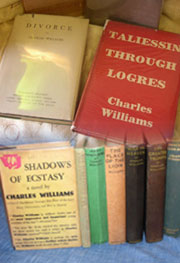Owen Barfield
Owen Barfield, born Arthur Owen Barfield in London in 1898, he was the youngest of four children. His father, Arthur, was a solicitor; his mother, Elizabeth (Lizzy), was an ardent feminist; a suffragette and a lover of music. He served in the Royal Engineers during World War I and later graduated from Wadham College, Oxford. From 1931 to his retirement in 1959, he was a practicing solicitor. Throughout his life he read widely in diverse fields: language, literature, historical semantics, comparative religion, and the history of science. He died in 1987.
In the 1920s Barfield joined Rudolf Steiner's anthroposophical movement - an occurrence which "hideously shocked" Lewis. Later, as Lewis learned more about anthroposophy, he found his initial horror turning into disgust and resentment. Lewis' attempts to discourage Barfield's belief in Steiner's philosophy took the form of a series of letters and essays which the two friends exchanged for the next several years. In his autobiography, Surprised by Joy, Lewis christened this debate, the Great War (named after the World War I).
Barfield's first book The Silver Trumpet was published in Great Britain by Faber and Gwyer (now Faber and Faber) in 1925, a little over a year after it was written. It sold respectably, and was well received by critics. C. S. Lewis first read Barfield's story in manuscript and recorded the following in his diary entry for October 20, 1923:
"… I began to read Barfield's faery tale The Silver Trumpet in which with prodigality he squirts out the most suggestive ideas, the loveliest pictures, and the raciest new coined words in wonderful succession. Nothing in its kind can be imagined better."
Because of Lewis, the J. R. R. Tolkien family also read Barfield's story.
Barfield's main works are:
- The Silver Trumpet (1925)
- History in English Words (1926)
- Poetic Diction: A Study in Meaning (1928)
- Romanticism Comes of Age (1944)
- Saving the Appearances: A Study in Idolatry (1957)
- Worlds Apart: A Dialogue of the Sixties (1963)
- Unancestral Voice (1965)
- Speaker's Meaning (1967)
- What Coleridge Thought

